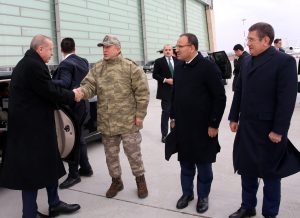
By Stephen Farrell
JERUSALEM (Reuters) – Israeli Prime Minister Benjamin Netanyahu accused Mahmoud Abbas of anti-Semitism and Holocaust denial on Wednesday after the Palestinian leader suggested in a speech that historic persecution of European Jews had been caused by their conduct.
Jewish groups also condemned Abbas’ comments, made in a speech on Monday to the Palestinian National Council, that Jews had suffered historically not because of their religion but because they had served as bankers and money lenders.
“It would appear that, once a Holocaust denier, always a Holocaust denier,” Netanyahu said on Twitter.
“I call upon the international community to condemn the grave anti-Semitism of Abu Mazen (Abbas), which should have long since passed from this world.”
Abbas said in his speech that Jews living in Europe had suffered massacres “every 10 to 15 years in some country since the 11th century and until the Holocaust”.
Citing books written by various authors, Abbas argued: “They say hatred against Jews was not because of their religion, it was because of their social profession. So the Jewish issue that had spread against the Jews across Europe was not because of their religion, it was because of usury and banks.”
“CLASSIC ANTI-SEMITE”
Netanyahu’s criticism was echoed by Jewish leaders around the world.
“Abbas’ speech in Ramallah are the words of a classic anti-Semite,” said Marvin Hier and Abraham Cooper of the U.S.-based Jewish human rights organization the Simon Wiesenthal Center.
“Instead of blaming the Jews, he should look in his own backyard to the role played by the Grand Mufti in supporting Adolf Hitler’s Final Solution,” they added.
They were referring to Muslim Grand Mufti Haj Amin Husseini, a World War Two ally of Adolf Hitler, whose “Final Solution” led to the killing of six million Jews in Europe.
U.S. Ambassador to Israel David Friedman tweeted that Abbas had “reached a new low in attributing the cause of massacres of Jewish people over the years to their ‘social behavior'”.
German Foreign Minister Heiko Maas and the foreign service of the European Union, the biggest donor of aid to the Palestinians, also condemned the comments.
“We reject any relativisation of the Holocaust,” Maas told Die Welt daily.
“Germany bears responsibility for the most atrocious crime of human history,” he said, adding the memory of the Holocaust was a constant reminder to tackle any form of anti-Semitism.
The European External Action Service in Brussels said in a statement: “Such rhetoric (about the Jews) will only play into the hands of those who do not want a two-state solution, which President Abbas has repeatedly advocated.”
Abbas’ spokesman Nabil Abu Rdainah declined comment on the criticism.
Abbas, 82, made his remarks in the West Bank city of Ramallah at a rare meeting of the Palestinian National Council, the de facto parliament of the Palestine Liberation Organisation (PLO), which Abbas heads.
A veteran member of Fatah, the dominant faction of the PLO, Abbas served for decades as a loyal deputy of his predecessor, Yasser Arafat. He assumed the leadership of Fatah, the PLO and the Palestinian Authority after Arafat died in 2004.
Abbas was born in 1935 in Safat, a town in the north of what was then British-ruled Palestine. His family became refugees in 1948, fleeing across the border to Syria as violence intensified between Jews and Arabs, culminating in war between the newly created State of Israel and its Arab neighbors in May 1948.
In 1982 Abbas obtained a doctorate in history at the Moscow Institute of Orientalism in the then-Soviet Union. His dissertation, entitled “The Secret Relationship between Nazism and the Zionist Movement”, drew widespread criticism from Jewish groups, who accused him of Holocaust denial.
(Additional reporting by Berlin and Brussels bureaus; Reporting by Stephen Farrell, Nidal al-Mughrabi, Ali Sawfta, Ari Rabinovitch; Editing by Gareth Jones)









